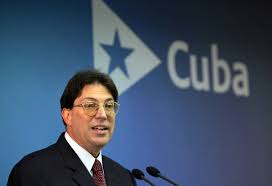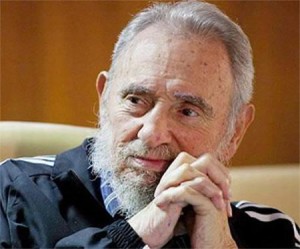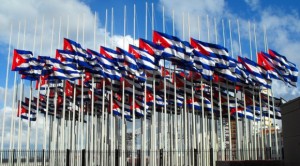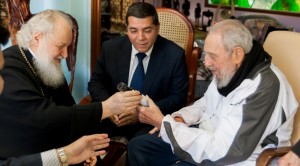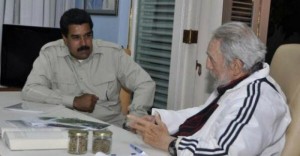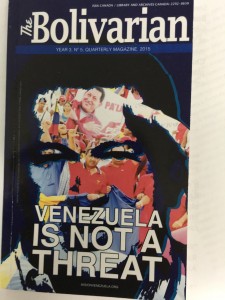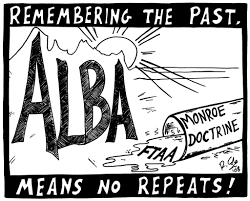Caracas.— Cuba’s Foreign Minister Bruno Rodríguez Parrilla called on the Bolivarian Alliance for the Peoples of Our America (Alba-TCP) to strengthen strategies to confront imperialist intervention and coup plots on the continent.
In his comments, during the Alba-TCP Political Council meeting to discuss common strategies to defend the region, Rodríguez likewise called on social movements to defend progressive governments facing attacks orchestrated by foreign powers, as is the case in Venezuela, which was subjected to an attempt by the Organization of American States (OAS) to justify intervention via the application of the bloc’s Inter-American Charter, as well as Brazil, where a parliamentary coup and media campaign are currently underway against the country’s legitimate President, Dilma Rousseff.
In his remarks, broadcast by teleSUR, the Cuban Foreign Minister emphasized the timeliness of Alba’s mobilization given the escalating right wing offensive taking place across the region.
He stressed that in these circumstances, it is the Alba-TCP Political Council’s responsibility to mobilize popular and political movements, revolutionary and progressive forces, trade unions, campesinos, and intellectuals to confront imperialist intervention, coups, and neo-liberalism.
The Cuban diplomat explained that to do so, regional unity and the gains achieved by the continent in international organizations such as the Union of South American Nations (UNASUR) and the Caribbean Community (CARICOM) must be consolidated. He stressed:
“Latin America and the Caribbean have changed, we are no longer, nor will we be, the backyard of the United States, we will not allow for the return of the carrot and the stick and I repeat that no one can beguile Cuba, which is still under blockade and whose territory in Guantánamo is still occupied, while attempts are made to isolate Venezuela.”
In this regard, he added that the region is at present threatened by the U.S. government and national oligarchies, who, for lack of popular support, “Again resort to coups to reverse sovereignty over our natural resources, our policies of independence and social development.”
During his speech to the Council, Rodríguez noted that the continent’s history will be defined in the current battle of Venezuela against constant threats, and reaffirmed Cuba’s solidarity and the deep bonds between the two nations. He said:
“The history of Latin America and the Caribbean is being decided in this battle, here in Venezuela, we will all defend, whatever the price, the legacy of (Hugo) Chávez and Venezuela will continue to have in Cuba a sister nation ready to share the same fate.”
Saint Kitts and Nevis Senior Foreign Service Officer, Samuel Berridge, also stated his country’s support for the Bolivarian Republic and highlighted the progress made during the past 17 years, thanks to agreements such as Petrocaribe, and the services provided to the peoples through different social missions.
“We are encouraged by the model of social cohesion in Venezuela,” Berridge stated, while expressing support for dialogue initiatives promoted by the national government, accompanied by the support of UNASUR.
“Saint Kitts and Nevis is supportive of the government and people of Venezuela and is committed to ensuring the onset of a new era of economic growth and development in Venezuela. Venezuela is an important member in our hemisphere, the country is of no interest to us weakened and will be of no benefit to Alba or the rest of the hemisphere,” he emphasized.
Meanwhile the Foreign Minister of the Bolivarian Republic of Venezuela, Delcy Rodríguez, condemned the media campaigns against leftist governments in the region, which seek to set the stage for imperialist aggression. She pointed out:
“The peoples do not want to go back to the dark decade of neoliberalism, they do not want to be politically, economically, financially suppressed and subjugated and handed over to the International Monetary Fund.”
According to Venezuelan President Nicolás Maduro, the main topic of discussion at the meeting was the need to create a common strategy for the defense and freedom of our revolutionary processes.
Meanwhile, Ecuador’s Foreign Minister, Guillaume Long, highlighted that the union of the ALBA-TCP countries is necessary to address and counter the effects of the global right in their attacks against the region.
The Minister of the Presidency of Bolivia, Juan Ramón Quintana, also condemned any attack against Venezuelan democracy on behalf of his country.
Source: Granma, June 10, 2016

